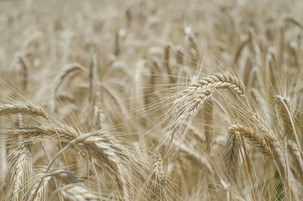 The Egyptians were urgent with the people to send them out of the land in haste. For they said, "We shall all be dead." So the people took their dough before it was leavened, their kneading bowls being bound up in their cloaks on their shoulders. Exodus 12:33-34 The Biblical Garden grows two ancient strains of wheat, Emmer and Einkorn, both first domesticated in the Near East more than 10,000 years ago. Wild wheat, the mother of all wheat, grows today in rocky soil of the Galilee and Golan Heights. Long before the Israelites arrived in Egypt, the Egyptians had learned the secret of leavening bread, allowing the dough to rise before baking, through the addition of yeast, by mixing it with a piece of already leavened “starter” dough or leaving it exposed to yeast spores in the air. At our Passover Seders, we are reminded of the haste with which the Israelites in Egypt fled that most settled and civilized land, from the culture of slaves whose lives depended on the leavened bread of Egypt, to the culture of matzah, the bread of free shepherds. During this coming season of liberation, living as we do in this sophisticated, technological age, we can think about the demands and distractions in our overscheduled lives that leave us little time to appreciate our blessings and the grace that surrounds us. Might we find the courage to gather our unleavened dough and bind up our kneading bowls in our cloaks, to set out on our journey anew, leaving behind self-absorption and impatience, aimless busyness and preoccupation with the accumulation of “stuff”? The truth is, we have very limited real needs. Matzah might just suffice to remind us that we can cultivate lives of greater authenticity, simplicity, and ruach if we choose. The wilderness awaits, but we have what we need for today, and we do not set out alone. Comments are closed.
|
AuthorsMichael Schlesinger is Temple Sinai’s Biblical Gardener. Mike has been gardening since he was eight years old. He used to grow grape vines and make wine when he lived in California. He now tends to our garden, continuing the traditions started by Catherine Walters. Archives
March 2020
|

Affiliated with the Union for Reform Judaism
30 Hagen Avenue • Cranston, RI 02920 • 401-942-8350 Office: dottie@templesinairi.org Rabbi Jeffrey Goldwasser: [email protected] |
Want to sign up for the weekly Sinai Scroll email?
Click here to receive weekly updates on Temple services, events and a message from the Rabbi. |


